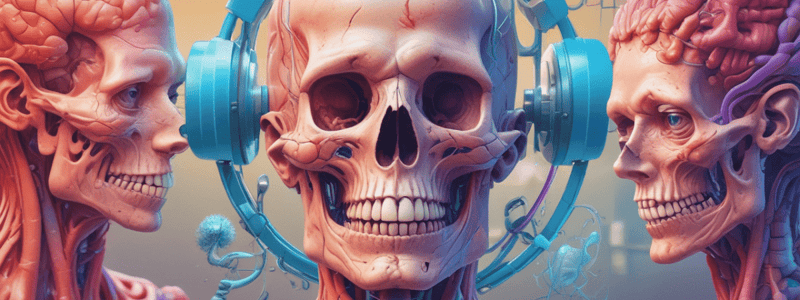Podcast
Questions and Answers
Which term best describes a disease where symptoms develop, then resolve, and then worsen?
Which term best describes a disease where symptoms develop, then resolve, and then worsen?
- Transient
- Progressive
- Exacerbating-remitting (correct)
- Improving
Which term refers to a disease where symptoms remain unchanged for an extended period of time?
Which term refers to a disease where symptoms remain unchanged for an extended period of time?
- Subacute
- Stationary (chronic) (correct)
- Chronic
- Acute
What type of disease is Alzheimer's Disease classified as?
What type of disease is Alzheimer's Disease classified as?
- Toxic-Metabolic Disease
- Degenerative disease (correct)
- Inflammatory disease
- Chronic disease
In which disease category do symptoms continue to progress over time?
In which disease category do symptoms continue to progress over time?
What is the term for a disease that is caused by vitamin deficiencies, genetic disorders, or drug toxicity?
What is the term for a disease that is caused by vitamin deficiencies, genetic disorders, or drug toxicity?
Which term best describes symptoms that resolve completely after onset?
Which term best describes symptoms that resolve completely after onset?
What is the most common cause of traumatic brain injury (TBI) according to the text?
What is the most common cause of traumatic brain injury (TBI) according to the text?
What is the term used to describe the injury that occurs on the opposite side of the brain from where the initial impact was in TBI?
What is the term used to describe the injury that occurs on the opposite side of the brain from where the initial impact was in TBI?
Which type of brain injury occurs when an object pierces the skull and enters brain tissue?
Which type of brain injury occurs when an object pierces the skull and enters brain tissue?
What percentage of individuals with TBI experience dysarthria post-brain injury according to the text?
What percentage of individuals with TBI experience dysarthria post-brain injury according to the text?
What percentage of mild traumatic brain injuries (TBIs) are estimated to cause permanent or long-term disability?
What percentage of mild traumatic brain injuries (TBIs) are estimated to cause permanent or long-term disability?
In TBI, what system is responsible for organizing, controlling, and executing movement within the speech motor system?
In TBI, what system is responsible for organizing, controlling, and executing movement within the speech motor system?
Acute symptoms typically develop within hours.
Acute symptoms typically develop within hours.
Inflammatory diseases are characterized by degeneration of affected tissues or organs over time.
Inflammatory diseases are characterized by degeneration of affected tissues or organs over time.
Improving diseases mean symptoms are completely resolved after onset.
Improving diseases mean symptoms are completely resolved after onset.
Progressive diseases show symptoms that peak and then resolve.
Progressive diseases show symptoms that peak and then resolve.
Exacerbating-remitting diseases follow a pattern of developing, resolving, and worsening symptoms.
Exacerbating-remitting diseases follow a pattern of developing, resolving, and worsening symptoms.
Toxic-Metabolic Diseases are caused by inflammatory responses to microorganisms.
Toxic-Metabolic Diseases are caused by inflammatory responses to microorganisms.
Dysarthria is a common symptom experienced by individuals with traumatic brain injury (TBI).
Dysarthria is a common symptom experienced by individuals with traumatic brain injury (TBI).
Permanent disability is more likely to occur in moderate TBI than in severe TBI cases.
Permanent disability is more likely to occur in moderate TBI than in severe TBI cases.
Coup and contrecoup brain injury can only happen on the opposite sides of the brain.
Coup and contrecoup brain injury can only happen on the opposite sides of the brain.
TBI can result from acceleration or deceleration of the head even in the absence of any physical impact.
TBI can result from acceleration or deceleration of the head even in the absence of any physical impact.
Prognosis for all severity levels of TBI is clearly defined and predictable.
Prognosis for all severity levels of TBI is clearly defined and predictable.
The motor speech system is exclusively controlled by the central nervous system.
The motor speech system is exclusively controlled by the central nervous system.




